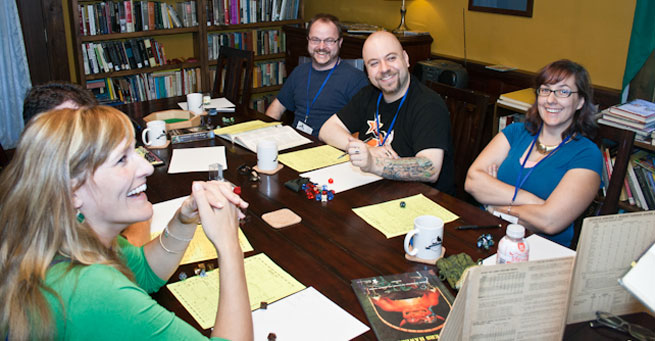In Above the Table we will cover discussions of all things gaming related. It also gives the Meeple bloggers a thinly veiled excuse to occasionally wax philosophical and indulge in some hopefully entertaining navel gazing.
Above the Table is a column not about specific board games, but about gaming as a hobby. There are a lot of topics to discuss, but I suppose an appropriate subject for the first Above the Table is the origin of the name itself. In addition to being a terribly clever play on words for a column about table top games, the phrase “above the table” is one I’ve found myself using often of late to describe my favorite aspect of some of my favorite hobby games – social interaction.
In many board games, the game play is all about the board and the pieces. What is happening with – or to – your pieces is what the game is all about. In these type of games your opponents are there primarily as a mechanism to move their pieces. You could conceivably play one of these games without ever speaking to your opponent – or without a human opponent at all. In fact, games of this nature translate very well to electronic medium, precisely for this reason. From a gameplay standpoint, playing a game like Agricola, Risk, or Lords of Waterdeep doesn’t change all that much whether you’re opposed by a person or a computer.
That’s not to say that you can’t have a great time playing these games with friends. It’s just that interacting with your opponent on a social level isn’t core to the mechanics of game play. These games take place mostly on the table.
Contrast that to titles such as Bohnanza, Gloom, or Sheriff of Nottingham. In these games, interacting directly with your opponents is the very point of the game. Negotiating deals, bluffing your opponents, or jointly weaving stories – such interactions are the primary mechanics of these games. When playing a game of this type, you spend the majority of the game looking not at the cards or tokens on the table, but at your opponents. These games take place above the table.
Most of my current favorite games are “above the table” games, and I have come to the conclusion that the social interaction mechanic is the reason. In a world where we are constantly chained to our electronic devices, where people are as likely to text each other across the dinner table as to speak to one another directly, there is something refreshing about having to look one another in the eye and interact.
I’ve also found that these types of games tend to be great introductions to the hobby for people that might otherwise balk at trying a board game. Explain the rules of your average worker placement to someone brand new to board gaming, and you may receive a blank stare. Tell them that the game is all about pulling a fast one on whichever family member is playing the Sheriff, on the other hand, and it clicks.
I suppose it’s not surprising then that we make use of these games to provide a great way for guests to spend quality time together. So the next time you’re at The Malted Meeple, try out a game that takes place “Above the Table”. You just might find you actually like that person sitting across the table from you!
Jim Reed is a lifelong gamer who started with the original red box Dungeons & Dragons. After spending 20 years in the corporate world, he decided it was high time that work be fun and struck out on his own. Jim now owns and operates Ravenwood Castle and The Malted Meeple, and spends his days ensuring his guests have as much fun as he does.

